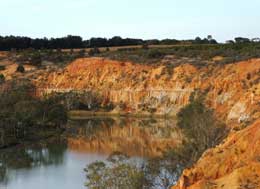09 March 2012
 By far Australia’s most significant agricultural area, the more than 3000 km Murray Darling Basin spans five states. And therein lies the historical difficulty in managing the resource.
By far Australia’s most significant agricultural area, the more than 3000 km Murray Darling Basin spans five states. And therein lies the historical difficulty in managing the resource.
From as early as 1917 is was clear that overarching management of the basin would be important and the River Murray Commission was established to advise on water supply. It was not until the creeping destruction salinity emerged in the 1980s that water quality became an issue for the Commission.
As environmental concern around the basin grew, it was clear that loose arrangements to manage the resource would no longer suffice if the basin was to remain viable. The Murray Darling Basin Agreement was adopted in 1985 but took a further eight years to be enacted. And today divisions between the states as to the best management of the basin continue to be politically volatile.
As we grapple with new ideas and regulations for managing the basin, the University of South Australia’s Hawke Centre is presenting a special panel session to inform and engage the South Australian community.
The special event with be held on Wednesday March 14 from 5 pm at the Allan Scott Auditorium City West campus, 50 – 55 North Terrace Adelaide.
The panel will be chaired by Professor Chris Daniels, Director of UniSA’s Barbara Hardy Institute, an ecology specialist, author and broadcaster well known for his 'citizen science' commitment.
This forum will bring together a panel representing a range of interests including the Premier of South Australia, Jay Weatherill and irrigator, environment and government experts to discuss the critical issues surrounding the draft Basin Plan and to engage the community in furthering the development of a State position.
Prof Daniels says the event will provide an amazing opportunity to better understand the issues surrounding the Murray Darling Basin Plan from many perspectives.
“If you come along to this event I think it is really important to have a look at the draft plan so you have some information to help you assess the views that will be presented across the evening,” he said.
“We have seen in the past few years how very fragile the ecology of the Murray Darling Basin is and that has underlined the urgent need for a national approach to managing the Basin based on sound science.
“The Basin Plan offers a once-in-a-lifetime opportunity to re-set the rules of the River in a way that builds resilience and ensures the long-term health of the entire river system.
“Being at the end of the Basin we suffer the worst impacts of the water over-allocation and diversions that occur upstream.”
Prof Daniels said South Australia has the most at stake with regard to the plan but also a very tough job in arguing its position amid the voices of larger economies such as NSW and Victoria.
“We need to be able to secure enough general agreement within SA and ensure that even diverse interests can find enough common ground to support a united position that gets the best deal for the State,” he said.
“To do that successfully we need to understand, the science, the economics and to some extent the politics of the plan. The more we know the more powerfully we can make our case.”
Panel members for the evening include Dr Susan Marsden, historical consultant and author; Dr Tony Minns, Director, Goyder Institute for Water Research; Jay Weatherill, Premier of South Australia; Mitch Williams, Deputy Leader of the Opposition and Shadow Minister for Water Security River Murray Energy Mineral Resources; Professor Diane Bell, Conservation Council SA; SA irrigator, Ben Haslett from the South Australian River Communities Group; Associate Professor Daryle Rigney, Dean Indigenous Strategy and Engagement, Flinders University and Co-Director, Ngarrindjeri Regional Authority Research Policy and Planning Unit.
You can read the draft basin plan with explanatory notes here. The event is free and you can register your attendance online
Media contact
- Michèle Nardelli office (08) 8302 0966 mobile 0418 823 673 email michele.nardelli@unisa.edu.au


